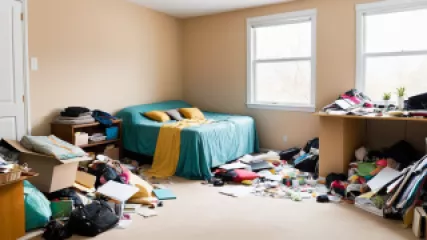The Hidden Toll of Clutter on Your Mental Well-Being
The Hidden Toll of Clutter on Your Mental Well-Being
Opinion Piece
We often underestimate the impact that clutter can have on our mental well-being. Many of us live in environments filled with excess belongings, disorganized spaces, and overwhelming mess. While it may seem trivial, the truth is that clutter can have a profound effect on our emotional state, leading to stress, anxiety, and even depression. In this opinion piece, I will explore the emotional effects of clutter and argue for the importance of creating a tidy and organized living space.
The Chaos of Clutter
Living in a cluttered environment can be mentally exhausting. The constant visual stimulation of disarray can overwhelm our senses and create a sense of chaos in our minds. It becomes difficult to focus, think clearly, and find peace in our own homes. The clutter not only occupies physical space but also occupies mental space, leaving little room for tranquility and calmness.
Moreover, clutter can trigger feelings of guilt and shame. We may feel embarrassed to invite friends or family over, fearing their judgment of our messy living conditions. This can lead to social isolation and a negative impact on our relationships. We become prisoners of our clutter, confined to its weight and burden.
The Weight of Emotional Attachment
One of the reasons clutter accumulates is our emotional attachment to objects. We hold onto items out of sentimentality, nostalgia, or fear of letting go. Each object represents a memory, an experience, or a part of our identity. However, when we allow these attachments to dictate our lives, clutter begins to take over.
Letting go can be incredibly difficult, but it is necessary for our mental well-being. The emotional weight of clutter can hold us back from moving forward, both physically and emotionally. By decluttering, we can create space for new experiences, personal growth, and a lighter state of mind.
The Overwhelm of Decision-Making
Clutter bombards us with an overwhelming number of decisions to make. Every item requires our attention, whether it's deciding to keep, donate, or discard it. The sheer volume of choices can be paralyzing, leading to decision fatigue and increased stress levels.
Studies have shown that clutter affects our ability to make clear decisions and solve problems effectively. The cluttered environment becomes a distraction, diverting our focus and cognitive resources away from the task at hand. This can hinder our productivity and contribute to feelings of frustration and inadequacy.
The Quest for Control
Clutter often reflects a lack of control in our lives. We may feel overwhelmed by external circumstances or internal struggles, and the chaos in our physical environment mirrors these feelings. The accumulation of clutter becomes a vicious cycle - as our mental state worsens, so does the clutter, and vice versa.
Creating order in our surroundings can help regain a sense of control and bring a feeling of calmness and stability. By taking charge of our living space, we can also begin to take charge of our lives. Tidying up becomes a tangible way to reclaim our power and restore balance.
The Cathartic Power of Decluttering
Decluttering is not just about creating a clean and organized space; it is a transformative process that can positively impact our mental well-being. As we let go of unnecessary belongings, we also let go of emotional baggage. The act of decluttering becomes a cathartic experience, allowing us to release negative energy and make room for positivity.
Furthermore, maintaining an organized living space can reduce stress and anxiety. When everything has a designated place, it becomes easier to find what we need, leading to increased efficiency and a sense of calm. We no longer waste time searching for lost items or feeling overwhelmed by the chaos around us.
Conclusion
Clutter may seem insignificant, but its impact on our mental well-being is far-reaching. It creates chaos, weighs us down emotionally, overwhelms our decision-making abilities, and reflects a lack of control. However, by recognizing the emotional effects of clutter and committing to decluttering, we can regain our sense of peace and create a space that nurtures our mental well-being. Let us embrace the transformative power of tidying up and reclaim control over our lives.
Disclaimer: The views and opinions expressed in this article are those of the author and do not necessarily reflect the official policy or position of any agency or organization.






